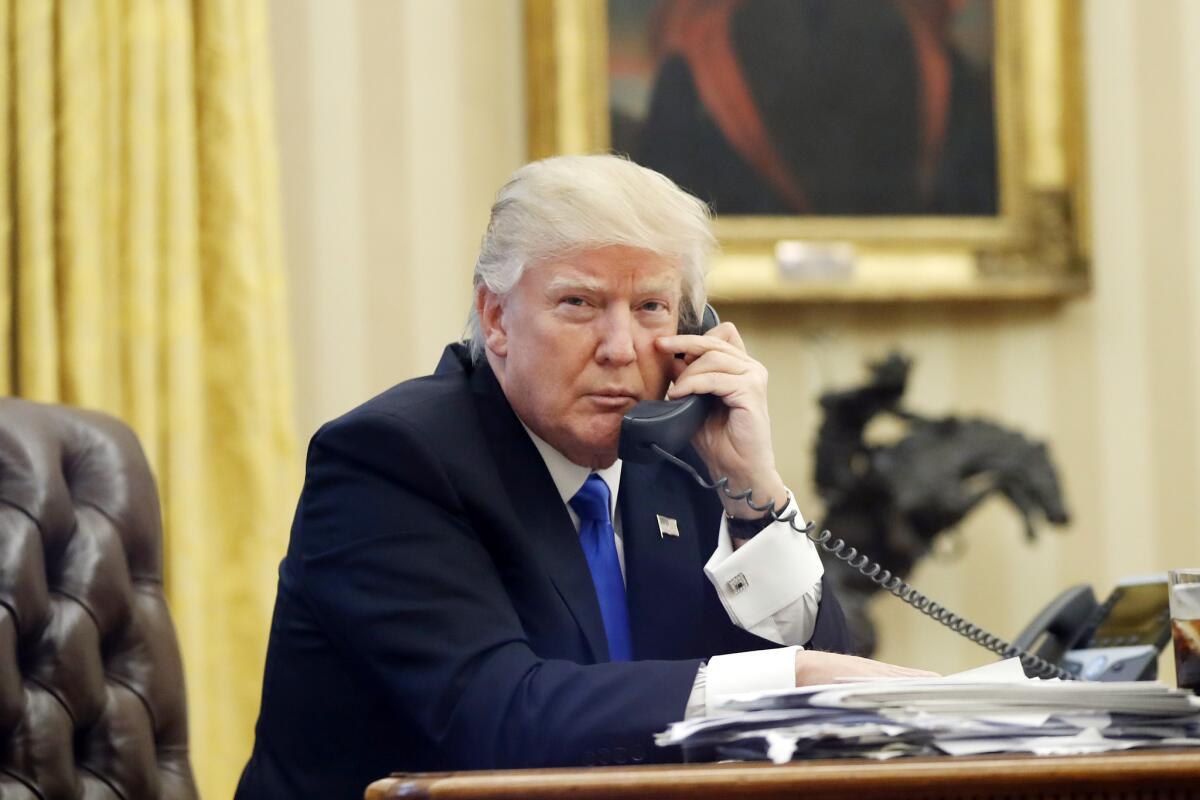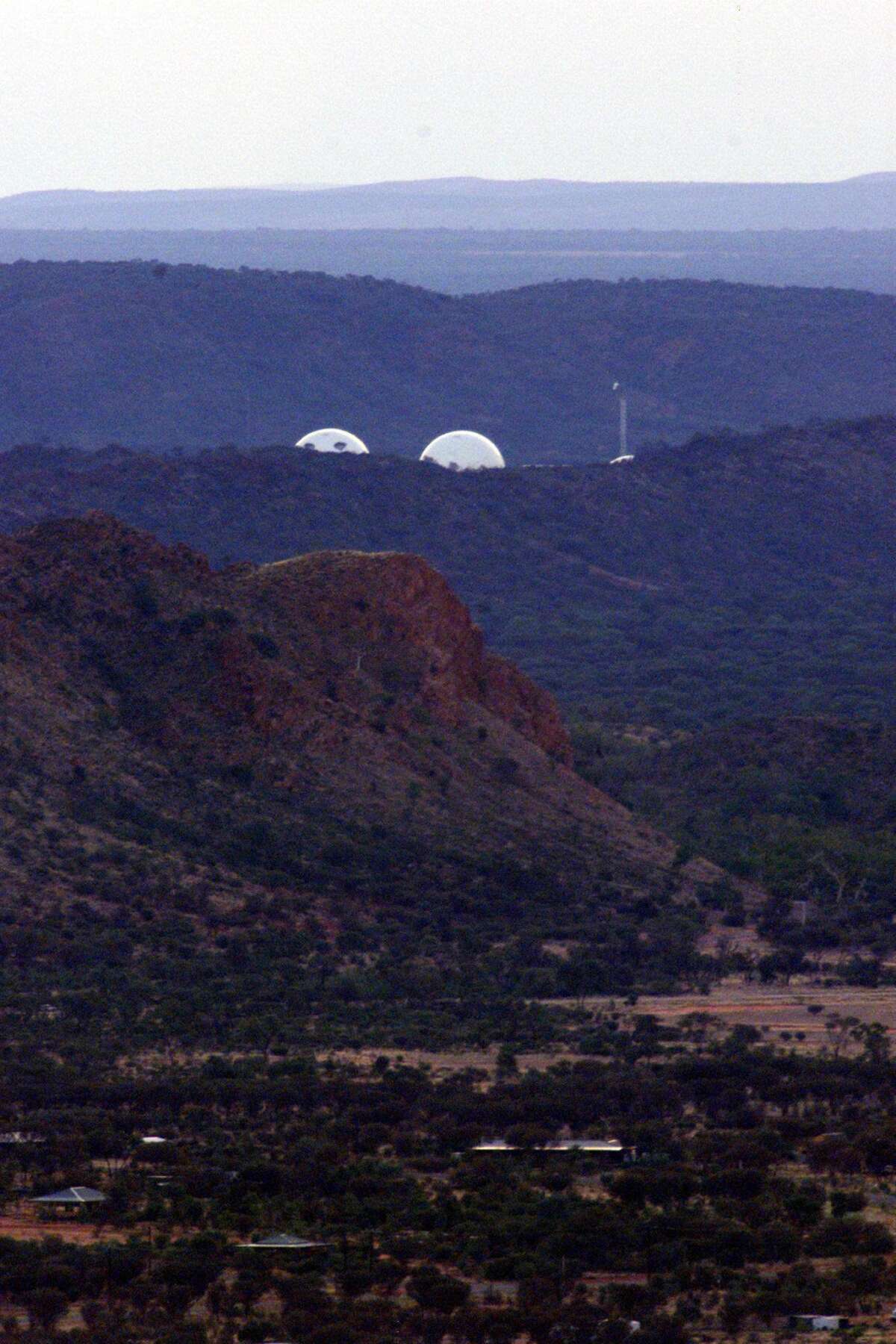There’s at least one reason why Trump might not want to alienate Australia

- Share via
Ever heard of ANZUS?
It may be a sign of the disproportionate global power gap between the United States and Australia that virtually all Aussies, but few Americans, can answer that question in the affirmative.
To Australians, ANZUS — the Australia New Zealand United States treaty — is the linchpin of the national defense. Under its provisions, Australia relies on the U.S. military to bail it out should anyone ever take it into their head to attack.
In return, the United States is allowed to maintain a crucial satellite spying facility on Australian soil that would provide early warning of a nuclear attack on the U.S.
Now, suddenly, in the wake of a tweet and a phone call, Australians are beginning to wonder about the future of the alliance.
The problem revolves around an agreement made late last year by former President Obama for the United States to take in some 1,250 refugees, whom Australia refuses to accept, from offshore detention centers.
President Trump spoke by phone Wednesday with Australian Prime Minister Malcolm Turnbull. The Washington Post, citing senior administration officials, said the president heatedly accused Australia of trying to export the next Boston bombers to America, and cut the call short. He later tweeted that he would “study this dumb deal,” raising speculation that he might dump it.
Australians were stunned, not by the political humiliation or even the refugee question, but by the military implications for ANZUS, the decades-old defense treaty.
The controversy prompted calls for Australia to look for reliable allies in its own region.
The refugees are the collateral damage in Australia’s widely criticized “Stop the Boats” policy, the rule that asylum seekers who try to reach Australian shores by sea will not “make Australia home,” even if they are genuine refugees, are children or have skills.
The deal with the Obama administration was announced days after Trump was elected president, raising doubts at the time about whether he would accept it. Shortly after the U.S. election, Turnbull got Trump’s personal phone number from golfer Greg Norman, a friend of the president, and proudly told Australians he was one of the first to call to congratulate him on his victory.
Less than three months later, he was smarting at Trump’s rebuff over the refugee deal.
ANZUS doesn’t bind America to protect Australia, but it is the reason successive Australian governments have sent military forces to help America fight wars in Vietnam, Afghanistan, Iraq and Syria.
Many Australians believe that were the country ever attacked, the U.S. military would come to the rescue.

For its part, Australia hosts the 50-year-old Pine Gap facility, not far from Alice Springs in the center of the nation, which enables American intelligence officials to intercept satellite transmissions, conduct spying operations and get early warning of a nuclear attack. Human rights groups claim the facility also provides geolocation data for U.S. drone strikes that have killed civilians.
There have been demonstrations against the site over many years, with critics saying it makes Australia a nuclear target.
Many in Australia, including former Labor Prime Minister Paul Keating, have argued that Australia needs to reduce reliance on the U.S. and forge more independent ties with allies in Asia. After Trump’s election, Keating said Australia’s foreign policy consisted of “tag-along rights to the U.S.”
“It’s time to cut the tag. It’s time to get out of it,” he said in a television interview in November.
Security analyst Rory Metcalf, head of the National Security College at Australian National University in Canberra, said in an interview Thursday that Trump’s approach could harm the alliance and would help Chinese strategic interests in the Asia-Pacific region.
“President Trump’s tweet will undermine the trust the Australian government has in the confidentiality and mutual respect that has long marked its communications with the U.S. leadership,” he said. “Trump is needlessly damaging the deep trust that binds one of America’s closest alliances. This will help China in its efforts to weaken the alliance system that supports Asia’s security and stability.”
Metcalf said the alliance was strong enough to weather the damage, but that China would see the opportunity in the moment.
“The challenge for advocates of the alliance is to remind Australians that it is strong, stable, enduring and in our interests, regardless of one president’s behavior,” he said.
The ANZUS treaty is seen by some in Australia as a Cold War relic, framed at a time when communism in Asia was seen as the enemy. But these days, Australia is relevant as one of a close-knit group of allies known as the “Five Eyes” — the U.S., Britain, Australia, Canada and New Zealand — who cooperate on intelligence and share information on matters such as potential terrorist threats.
Ian Hall, analyst in the school of government and international relations at Griffith University in Brisbane, argues that Australia must plan for the end of the American century.
Trump’s “America First” doctrine has set aside the liberal world order, and replaced it with “with transactional, mercantilist, sphere of influence, great power politics,” he wrote in a blog on governance and policy. Australia’s best choice is to forge deeper strategic links with middle-ranking powers in the region, he wrote.
“Canberra needs to learn how to lead — here, and in collaboration with the like-minded in our region — and learn fast,” he wrote.
Twitter: @RobynDixon_LAT
ALSO
New Secretary of State Rex Tillerson already has fences to mend — with his own diplomatic corps
More to Read
Sign up for Essential California
The most important California stories and recommendations in your inbox every morning.
You may occasionally receive promotional content from the Los Angeles Times.










